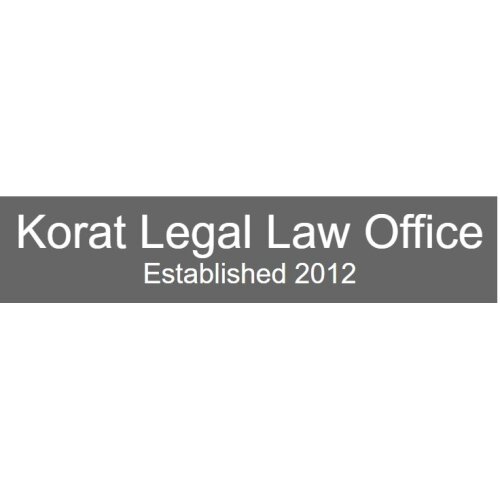Best Banking & Finance Lawyers in Nakhon Ratchasima
Share your needs with us, get contacted by law firms.
Free. Takes 2 min.
List of the best lawyers in Nakhon Ratchasima, Thailand
Thailand Banking & Finance Legal Articles
Browse our 5 legal articles about Banking & Finance in Thailand written by expert lawyers.
- Thailand Strengthens Anti-Money Laundering Laws with New Amendments
- Thailand has taken an important step in the fight against financial crime. On the approval of two new legislative amendments aimed at strengthening its anti-money laundering (AML) laws. On February 25, 2025, the Thai cabinet, led by Prime Minister Paetongtarn Shinawatra, approved amendments of the Anti-Money Laundering Act. These new... Read more →
- Steps to Open a Bank Account in Thailand as a Foreigner
- Opening a bank account in Thailand as a foreigner may streamline financial activities and make life more comfortable. Whether you’re planning a long-term stay in the country, establishing a company, or just seeking a sensible method to manage your finances, taking note of the setup procedure may save time and... Read more →
- Thai Legal Framework for Cryptocurrencies
- Technology, investment, and money have all been fundamentally altered by cryptocurrencies. Countries all throughout the globe struggle to design legal regimes that safeguard consumers while fostering innovation as these digital assets develop. Thailand distinguishes itself in this sense as it has one of the most thorough regulatory frameworks regarding cryptocurrencies... Read more →
About Banking & Finance Law in Nakhon Ratchasima, Thailand
Nakhon Ratchasima, also known as Korat, is a major city in the northeast of Thailand, playing a significant role in the country's economic landscape. Banking and finance law in this region is governed by both local and national legislation, providing a framework for financial transactions, banking operations, commercial loans, and other financial services. It encompasses a range of activities including the regulation of financial institutions, oversight of electronic transactions, and the protection of consumers in financial dealings. As Nakhon Ratchasima continues to develop, understanding and navigating the complexities of banking and finance law have become pivotal for businesses and individuals alike.
Why You May Need a Lawyer
There are numerous situations where seeking legal advice in banking and finance becomes crucial. Individuals and businesses might require legal assistance for securing loans, interpreting financial contracts, and complying with regulations. You may also need a lawyer to resolve disputes with financial institutions, manage debt restructuring, or handle issues related to mergers and acquisitions. Additionally, legal assistance may be required for investment advice, risk management, or navigating complex regulatory environments. Having a lawyer can help ensure that your transactions comply with legal standards and protect your interests.
Local Laws Overview
In Nakhon Ratchasima, banking and finance laws are influenced by both local customs and nationwide legislation such as the Financial Institutions Business Act and the Securities and Exchange Act. Key aspects include the regulation of banking operations, requirements for financial transparency, and the protection of consumer rights. The Bank of Thailand plays a critical role in overseeing financial transactions and ensuring stability within the financial system. Additionally, the Electronic Transactions Act regulates digital financial transactions, reflecting the growing trend towards an electronic economy.
Frequently Asked Questions
What is the role of the Bank of Thailand in Nakhon Ratchasima?
The Bank of Thailand regulates financial institutions to ensure stability and efficiency in the banking sector, offering guidelines and standards that financial entities in Nakhon Ratchasima must adhere to.
Do I need legal representation for a business loan?
While not legally required, having a lawyer can ensure that your business loans and agreements align with your best interests and comply with financial regulations.
How are consumer rights protected in financial transactions?
Consumer rights are protected under various laws that ensure transparency, fair practices, and recourse in case of disputes with financial institutions.
What should I do if I have a dispute with my bank?
It's advisable to first communicate directly with your bank to resolve the issue. If unresolved, seeking legal assistance can help navigate and mediate your case effectively.
Are electronic transactions safe in Nakhon Ratchasima?
Yes, electronic transactions are governed by the Electronic Transactions Act, which ensures security and legal recognition of digital transactions.
Can foreigners invest in local businesses?
Foreign investment is allowed, but it is subject to certain regulations and restrictions to safeguard local interests, which a lawyer can help clarify.
What are the tax implications of banking transactions?
Banking transactions can have various tax implications, and it is recommended to consult with a lawyer or tax advisor to understand applicable tax regulations.
How do mergers and acquisitions work legally in Nakhon Ratchasima?
Mergers and acquisitions require navigating complex laws and regulations, often necessitating legal due diligence and the drafting of agreements compliant with Thai law.
What is the importance of a financial contract?
Financial contracts establish the terms and conditions of financial dealings, protecting the interests of all parties and ensuring compliance with legal standards.
How can I manage financial risk?
You can manage financial risk through proper planning, understanding legal obligations, and seeking professional legal advice to mitigate potential issues.
Additional Resources
For those seeking more information or assistance, the following resources may be invaluable:
- The Bank of Thailand - for regulations and guidelines.
- The Ministry of Finance - for information on fiscal policies and regulations.
- The Office of the Consumer Protection Board - for consumer rights and dispute resolution.
- Local Chambers of Commerce - offer insights into business regulations and opportunities.
Next Steps
If you need legal assistance in banking and finance, consider the following steps:
- Identify the specific issue or question you have in the realm of banking and finance.
- Research and find a qualified lawyer in Nakhon Ratchasima with expertise in banking and finance law.
- Prepare all necessary documents and information related to your case or inquiry.
- Schedule a consultation to discuss your situation and explore potential solutions.
- Follow the lawyer's advice to ensure compliance and to protect your financial interests effectively.
Lawzana helps you find the best lawyers and law firms in Nakhon Ratchasima through a curated and pre-screened list of qualified legal professionals. Our platform offers rankings and detailed profiles of attorneys and law firms, allowing you to compare based on practice areas, including Banking & Finance, experience, and client feedback.
Each profile includes a description of the firm's areas of practice, client reviews, team members and partners, year of establishment, spoken languages, office locations, contact information, social media presence, and any published articles or resources. Most firms on our platform speak English and are experienced in both local and international legal matters.
Get a quote from top-rated law firms in Nakhon Ratchasima, Thailand — quickly, securely, and without unnecessary hassle.
Disclaimer:
The information provided on this page is for general informational purposes only and does not constitute legal advice. While we strive to ensure the accuracy and relevance of the content, legal information may change over time, and interpretations of the law can vary. You should always consult with a qualified legal professional for advice specific to your situation.
We disclaim all liability for actions taken or not taken based on the content of this page. If you believe any information is incorrect or outdated, please contact us, and we will review and update it where appropriate.
Browse banking & finance law firms by service in Nakhon Ratchasima, Thailand
Nakhon Ratchasima, Thailand Attorneys in related practice areas.









